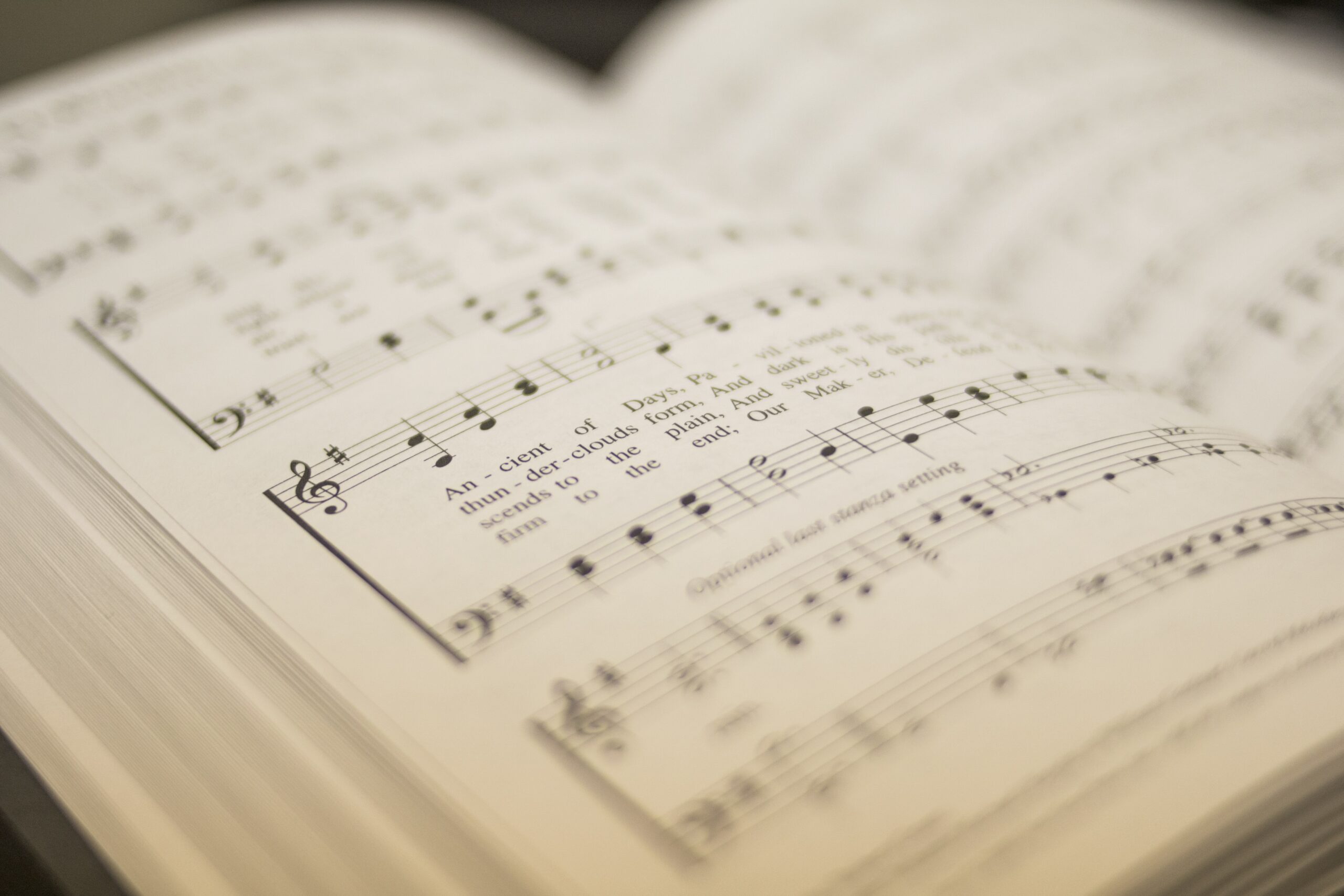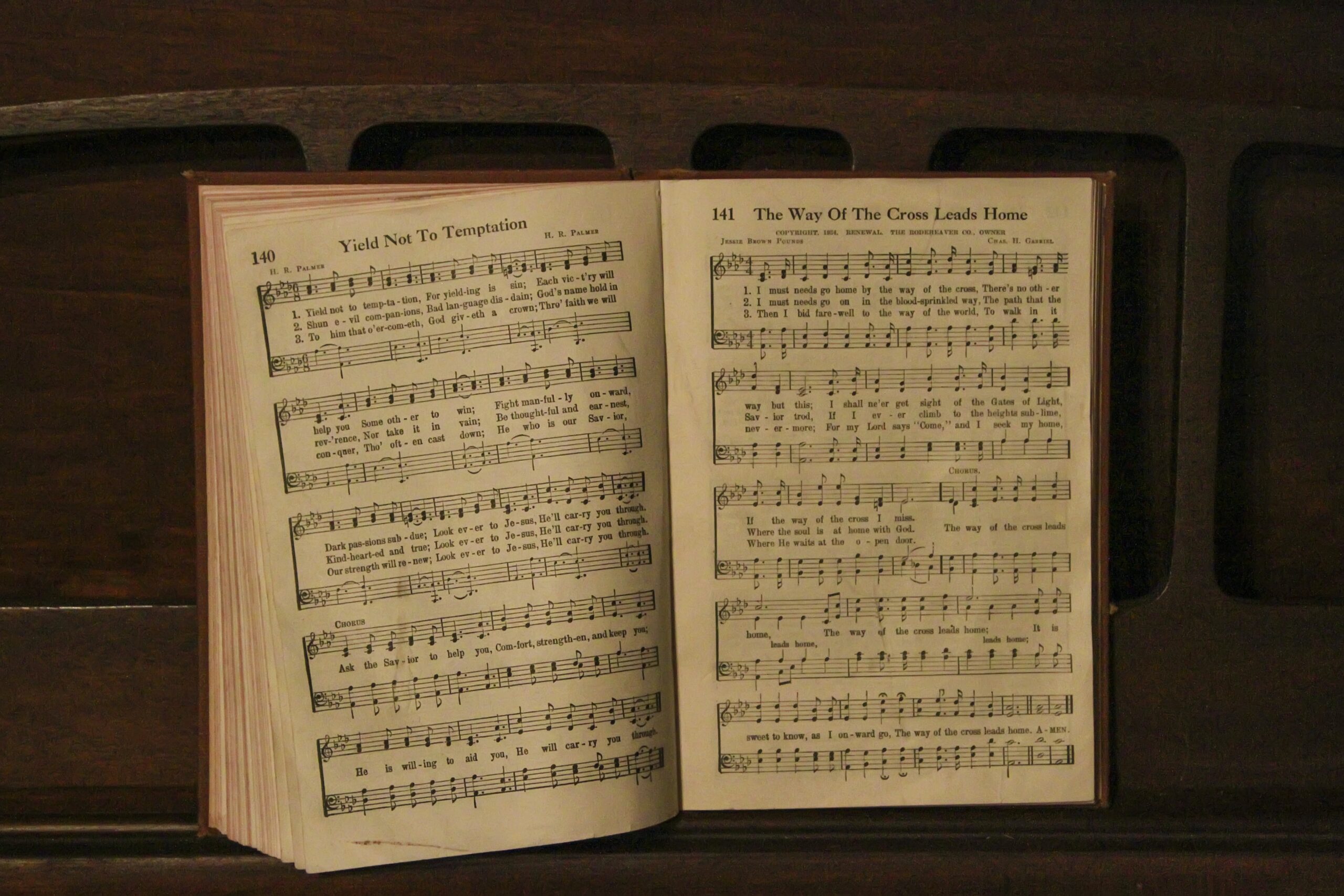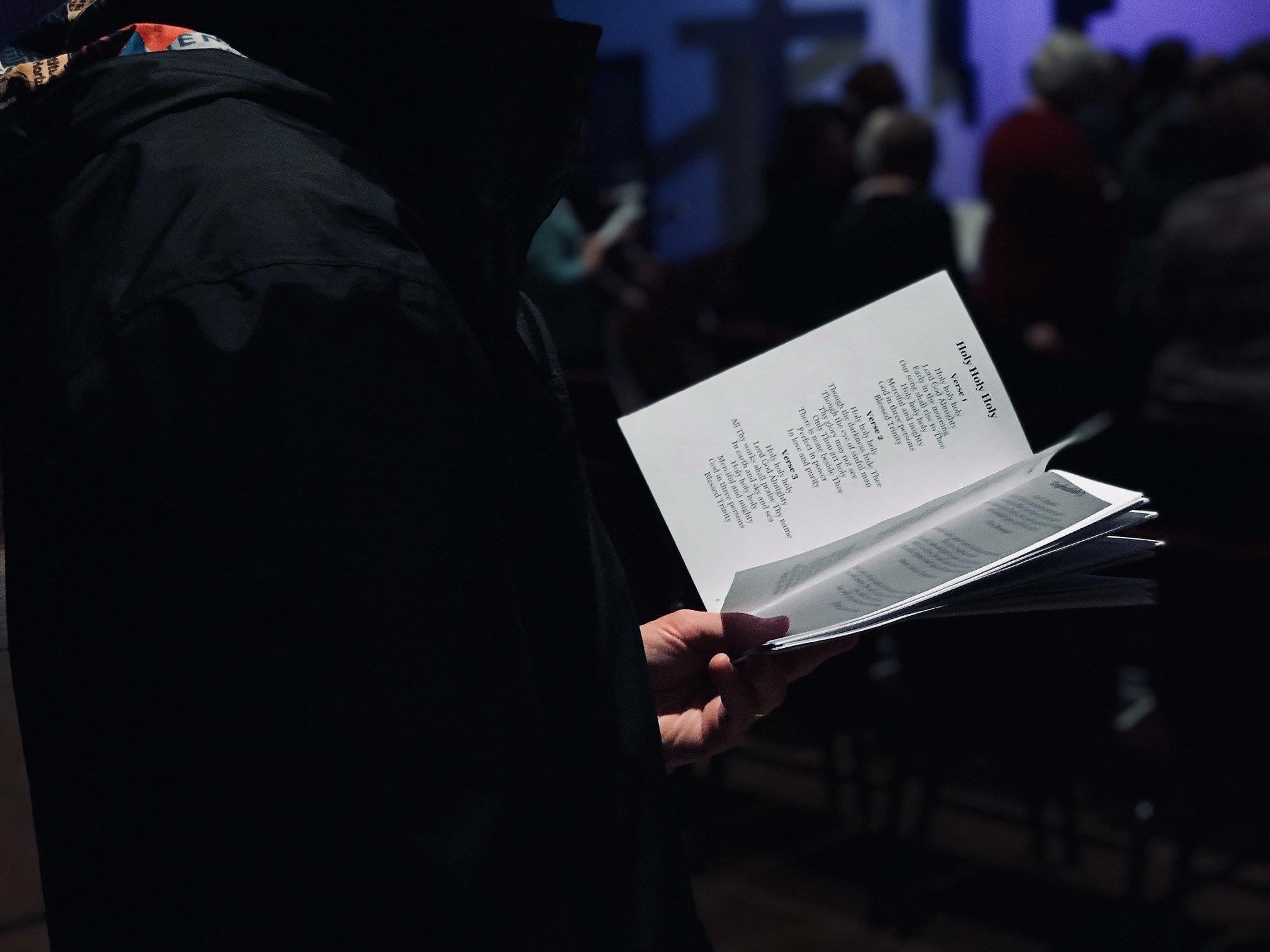Immerse yourself in the mesmerizing world of hymns inspired by scripture and discover how they can deeply enrich your spiritual devotion. These sacred songs, steeped in the wisdom of biblical scripture, have long been recognized for their power to uplift, inspire, and connect individuals with the divine. In this article, you will uncover the profound beauty that resides within these hymns and gain a deeper understanding of their significance in fostering a stronger connection to your faith. Get ready to embark on a journey that will ignite your soul and illuminate the path to a more profound spiritual experience.

The Importance of Hymns in Spiritual Devotion
Hymns hold a significant place in the realm of spiritual devotion. They are not just songs; rather, they serve as a powerful form of worship, a tool for meditation, a means of expressing faith, and a source of inspiration. Through their lyrical and melodic composition, hymns have the ability to touch the deepest parts of our souls and connect us to something greater than ourselves.
Hymns as a Form of Worship
When we engage in singing hymns, we are participating in a form of worship that transcends mere words and melodies. Hymns invite us to direct our focus and adoration towards the divine. They allow us to express our love, gratitude, and reverence for God in a more profound and meaningful way. Through hymn-singing, we surrender ourselves to a sacred space where we can connect with the divine and align our hearts with the purposes of God.
Hymns as a Tool for Meditation
Hymns have long been recognized as a valuable tool for meditation. As we sing or listen to hymns, we are prompted to reflect on the truths contained within the lyrics. The repetition of familiar hymns can calm our minds and create a sense of peace, enabling us to enter into a state of deep contemplation. Hymns provide a method of focusing our attention on the eternal and stir our hearts to ponder the profound mysteries of faith.
Hymns as a Means of Expressing Faith
In times when words fail us, hymns offer a powerful means of expressing our faith. Through the poetry and melodies of hymns, we can articulate the deepest longings of our hearts, the doubts and fears we face, and the hope and joy that sustain us. Hymns become a vehicle for our emotions and a conduit for sincere communication with God. They allow us to pour out our hearts in a unique and personal way, strengthening our faith and drawing us closer to the divine.
Hymns as a Source of Inspiration
Hymns have the power to inspire and uplift us, providing a source of encouragement and motivation. Through their timeless messages, hymns remind us of the faithfulness and goodness of God, even in the midst of challenges and trials. They serve as a reminder of the rich heritage of believers who have gone before us, whose stories of faith and perseverance continue to inspire generations. Hymns have the ability to instill hope, ignite passion, and ignite a sense of purpose in our spiritual journey.
The Historical Roots of Hymns
Hymns have a rich and storied history that spans across ancient times and various religious traditions. Understanding the historical roots of hymns can deepen our appreciation for their role in spiritual devotion.
Hymns in Ancient Times
The use of hymns can be traced back to ancient civilizations, where they were employed as a means of expressing devotion to deities or higher powers. In cultures such as Ancient Greece and Egypt, hymns were integral to religious rituals and were passed down from generation to generation. These early hymns were characterized by poetic language and melodic chants, serving as a way to honor the divine and seek favor from the gods.
Hymns in Judeo-Christian Tradition
In the Judeo-Christian tradition, hymns have been an integral part of religious worship for centuries. The book of Psalms in the Hebrew Bible served as a collection of hymns and prayers that were sung during worship services and private devotions. The Psalms cover a wide range of emotions and themes, reflecting the diverse experiences and spiritual journeys of the writers. The hymnody of ancient Israel influenced the development of hymns in Christian worship, providing a strong foundation for the music and poetic expressions of faith.
Hymns in the Early Church
As Christianity spread in the early centuries, hymns played a vital role in the worship practices of the fledgling church. Hymns served as a means of communicating the central doctrines of the Christian faith and proclaiming the message of salvation. Early Christian hymns, known as hymns of praise or hymns of thanksgiving, were sung in gatherings of believers as an act of communal worship. These hymns expressed the theological truths of Christianity and encouraged believers to live out their faith with conviction and devotion.
The Structure and Themes of Hymns Based on Scripture
Hymns based on scripture draw inspiration from the rich tapestry of biblical narratives, teachings, and poetry. These hymns not only convey the spiritual insights found within the Bible but also celebrate the transformative power of God’s word.
Biblical References in Hymns
Hymns rooted in scripture often contain direct references to specific passages or stories found within the Bible. By incorporating these biblical references, hymn writers engage in a dialogical relationship with the sacred text, infusing their compositions with depth and meaning. From the creation account in Genesis to the redemptive work of Christ in the New Testament, hymns based on scripture encompass the breadth and depth of God’s revelation to humanity.
Devotional Themes in Hymns
Hymns based on scripture explore a myriad of devotional themes. They delve into the attributes of God, the nature of faith, the beauty of creation, and the challenges and triumphs of the Christian journey. These hymns serve as a means of expressing the joys and sorrows, doubts and certainties, struggles and victories that are part of the believer’s experience. By drawing upon biblical narratives and teachings, hymns provide a framework for reflecting on and responding to the truths of scripture.
The Role of Psalms in Hymnody
The book of Psalms, a collection of hymns and prayers, holds a special place in the realm of hymnody. These ancient songs provide a wellspring of inspiration for hymn writers, as they encompass a diverse range of emotions, desires, and experiences. The Psalms reflect the raw and honest conversations between humanity and the divine, offering a model for authentic and heartfelt expressions of faith. Hymns inspired by the Psalms serve as a bridge between the ancient wisdom of scripture and the contemporary worship practices of the church.
The Impact of Hymns on Spiritual Growth
The singing and contemplation of hymns have a profound impact on the spiritual growth and development of individuals and communities. Hymns have the ability to strengthen the relationship with God, deepen the understanding of scripture, and foster fellowship and communal worship.
Strengthening the Relationship with God
Hymns provide a unique avenue for nurturing and deepening the relationship with God. Through the melodic expressions of love, adoration, and confession, hymns allow individuals to draw near to the divine and experience a sense of intimacy and communion. As hymn singers engage in worship, their hearts are softened, their spirits are lifted, and their minds are transformed. The act of singing hymns becomes a transformative encounter with the divine, where lives are changed and hearts are aligned with the purposes of God.
Forming a Deeper Understanding of Scripture
Hymns based on scripture offer a powerful tool for engaging with the Word of God in a unique and memorable way. As believers sing and reflect upon the lyrics of these hymns, they are provided with opportunities to delve deeper into the biblical text and gain a richer understanding of its meaning and significance. Through the repetition and meditation of hymns, individuals internalize the truths of scripture and find practical application for their lives. Hymns become a gateway to unlocking the treasures of God’s word and illuminating the path of spiritual growth.
Fostering Fellowship and Communal Worship
Hymn singing has always been a communal practice, bringing believers together in a shared expression of faith. As individuals gather to sing hymns, a sense of unity and fellowship is fostered, transcending differences in age, background, and culture. Hymns create a space where the body of Christ can join their voices in harmony, reinforcing a sense of belonging and reminding individuals of their shared identity as worshippers of the one true God. Through hymn singing, the church experiences a taste of the eternal, where all believers are united in their devotion to the divine.

Examples of Popular Hymns Based on Scripture
Throughout history, certain hymns have emerged as beloved favorites within the realm of church worship. These hymns not only captivate the hearts and minds of worshippers but also serve as powerful testaments to the enduring power of scripture.
Amazing Grace
“Amazing Grace” is perhaps one of the most widely recognized and cherished hymns based on scripture. Penned by John Newton in the 18th century, this hymn expresses profound gratitude for God’s forgiveness and unmerited favor. Drawing from the teachings of Christ and the apostle Paul, the lyrics of “Amazing Grace” encapsulate the transformative message of salvation and redemption found in the Gospel.
How Great Thou Art
“How Great Thou Art” is another hymn that has resonated deeply with believers across generations. Based on Psalm 145, this hymn exalts the greatness of God’s creation and the beauty of His handiwork. As worshippers sing the stirring melody and contemplate the majestic lyrics, they are invited to marvel at the splendor of God’s creation and join in the chorus of praise found in the natural world.
Great Is Thy Faithfulness
“Great Is Thy Faithfulness” is a hymn that draws its inspiration from Lamentations 3:22-23. This hymn has been a constant source of comfort and assurance for countless individuals. Its lyrics proclaim the faithfulness and steadfast love of God, even in the midst of trials and challenges. As believers sing these words, they are reminded of the unchanging nature of God’s character and His unwavering presence in their lives.
It Is Well with My Soul
“It Is Well with My Soul” is a hymn that carries a powerful message of hope and trust in God’s sovereignty. Penned by Horatio Spafford in the face of personal tragedy, the lyrics of this hymn reflect a profound sense of peace and surrender in the midst of suffering. Based on the biblical truth found in Psalm 46:10, this hymn serves as a reminder that, no matter the circumstances, God is faithful and His peace can sustain us through the darkest of times.
Comparing Traditional Hymns and Contemporary Worship Songs
Within the realm of Christian worship, there is a rich tapestry of music that encompasses both traditional hymns and contemporary worship songs. While these two forms of musical expression have distinct characteristics, they both serve a vital role in the worship practices of the church.
Traditional Hymns
Traditional hymns hold a cherished place in the history and heritage of the church. These hymns, often rooted in a specific time or cultural context, have stood the test of time and continue to be beloved by many. They are characterized by rich theological content, poetic language, and melodies that have become ingrained in the collective memory of believers. Traditional hymns provide a sense of stability, offering a connection to the biblical and historical roots of the Christian faith.
Contemporary Worship Songs
Contemporary worship songs, on the other hand, have emerged more recently in response to the changing cultural and musical landscape. These songs often incorporate elements of popular music styles and feature lyrics that speak directly to the experiences and realities of believers in the present day. Contemporary worship songs are characterized by their accessibility, catchy melodies, and a focus on individual and personal worship. They provide a relevant and relatable expression of faith for many worshippers.
Finding a Balance in the Church
While the divide between traditional hymns and contemporary worship songs may at times seem stark, a balanced approach to music in the church can foster unity and spiritual growth. Both traditional hymns and contemporary worship songs have their unique strengths and can coexist harmoniously. By intentionally selecting a blend of hymns and worship songs, the church creates an environment where individuals of all ages and backgrounds can engage in worship that is meaningful and authentic. The unity found in diverse musical expressions can reflect the breadth and depth of the body of Christ and promote a sense of unity amidst diversity.

The Role of Music in Enhancing Spiritual Devotion
Music holds a special place in the realm of spiritual devotion. Its power to move, inspire, and uplift provides a unique avenue for connecting with the divine. When it comes to hymns, the combination of melody, harmony, and lyrics creates a potent synergy that enhances our spiritual encounters.
The Power of Melody and Harmony
Melody and harmony, the core elements of music, play a significant role in enhancing our spiritual experiences. The melody of a hymn can evoke emotions, elicit memories, and create a sense of beauty and transcendence. Whether soaring and triumphant or gentle and contemplative, the melodies of hymns have the power to lift our spirits and transport us to a place of divine encounter. Harmony, with its interplay of chords and voices, brings depth and richness to hymns, creating a sonic tapestry that envelops and engages the listener. The combination of melody and harmony in hymns is a powerful tool for engaging both our hearts and minds in worship.
The Influence of Lyrics
The lyrics of hymns are integral to their impact on spiritual devotion. Through the carefully crafted poetry of hymns, theological truths are woven into the fabric of music. Hymn lyrics provide a means of proclamation, celebrating the attributes and acts of God. They also offer a language of confession and petition, allowing for a deeper expression of our hearts and the complexities of our faith. The words of hymns inspire, challenge, and comfort, serving as a bridge between the divine and the human. As we sing hymns, the lyrics become a source of inspiration, guiding our thoughts and attitudes towards God.
The Role of Singing in Personal and Corporate Worship
Singing hymns is an active and participatory form of worship that enriches our personal and corporate encounters with the divine. The act of singing engages not only our voices but also our entire selves – our minds, bodies, and spirits. As we sing hymns, we enter into a sacred dialogue with the divine, offering our worship and adoration while also receiving the nourishment and guidance we need. Singing allows us to connect with something greater than ourselves, promoting a sense of transcendence and unity as we join our voices with those around us. In both personal and corporate worship, singing hymns becomes a transformative experience that deepens our devotion and fosters a sense of connectedness with God and one another.
Hymns as a Source of Comfort and Encouragement
In times of trials and suffering, hymns have served as a source of comfort and encouragement for countless individuals. They provide solace, hope, and a reminder of God’s presence, even in the darkest of times.
Hymns in Times of Trials and Suffering
When faced with trials and suffering, hymns become a refuge and a source of solace. Their lyrics offer a language to express grief, lament, and anguish, allowing individuals to pour out their hearts to God. Hymns speak to the depths of human emotions and provide a way to process and navigate the complexities of pain. In the midst of suffering, the melodies and lyrics of hymns become a lifeline, reminding individuals that they are not alone and that God is present, offering comfort and strength in the midst of adversity.
Finding Hope and Strength in Hymns
Hymns are imbued with messages of hope and strength that can sustain individuals in their darkest hours. The lyrics remind us of God’s faithfulness, His promises, and His power to bring about restoration and redemption. Hymns affirm that there is purpose in suffering and that there is hope beyond the pain. As individuals sing or listen to these hymns, they find encouragement and assurance that God is working all things together for their good. Hymns become beacons of light, piercing through the darkness and guiding individuals towards hope and healing.
Hymns as Prayers and Laments
Hymns can be seen as both prayers and laments, allowing individuals to voice their deepest longings and wrestle with their most pressing questions. The lyrics of hymns provide a framework for pouring out our hearts before God, offering Him our joys, sorrows, doubts, and fears. Hymns become a means of surrendering our burdens and finding solace in the presence of the divine. Through hymns, individuals find validation for their experiences and are reminded that God hears their cries and walks alongside them in their journey.

The Process of Creating Hymns Based on Scripture
Creating hymns based on scripture involves a thoughtful and intentional process. Hymn writers must skillfully select and interpret scriptural passages, compose melodies and harmonies, and craft lyrics that are both inspirational and scripturally accurate.
Selecting and Interpreting Scriptural Passages
The process of creating a hymn based on scripture begins with the careful selection and interpretation of biblical passages. Hymn writers immerse themselves in the text, seeking to understand its context, meaning, and relevance to the themes they wish to convey. They explore different translations, consult commentaries and theological resources, and engage in personal reflection and prayer. Through this process, hymn writers discern the key messages within the scripture and determine how best to convey them through the medium of music.
Composing Melodies and Harmonies
Melodies and harmonies are essential components of hymns, as they provide the musical framework for the lyrics. Hymn writers carefully craft the melodies and harmonies to reflect the emotional and theological content of the hymn. They consider factors such as rhythm, musical intervals, and overall structure, seeking to create a melody that is both memorable and musically pleasing. The interplay of different voices and musical elements in the harmonies further enhance the impact of the hymn, creating a soundscape that resonates with the spirit of the lyrics.
Writing Inspirational and Scripturally Accurate Lyrics
Writing lyrics for hymns based on scripture requires a balance between inspiration and scriptural accuracy. Hymn writers seek to create poetic and evocative language that captures the essence of the scriptural message. They strive to craft verses and choruses that are both memorable and meaningful, ensuring that the lyrics resonate with the hearts and minds of worshippers. At the same time, hymn writers are committed to maintaining scriptural integrity, ensuring that the lyrics align with the teachings and truths of the Bible. They engage in careful study and reflection, seeking the guidance of the Holy Spirit in crafting lyrics that are both artistically expressive and faithful to the Word of God.
The Continued Relevance of Hymns in Contemporary Worship
Despite the changing trends and styles in worship music, hymns continue to hold a place of significance within contemporary worship. Their continued relevance can be attributed to the preservation of tradition and historical connections, the ability to connect the past with the present, and the richness of the hymn texts.
Preserving Tradition and Historical Connections
Hymns serve as a link to the rich tradition and heritage of the church. They connect us to believers who have gone before us, whose stories and experiences continue to inspire and guide us. By preserving traditional hymns within contemporary worship, we honor the legacy of those who have faithfully worshipped throughout the ages. The melodies and lyrics of hymns carry with them the weight of history, reminding us that we are part of a greater narrative and a communion of saints.
Connecting the Past with the Present
Hymns have the unique ability to bridge the gap between the past and the present, connecting timeless truths with the realities of today. The themes and messages found within traditional hymns remain relevant and applicable to the challenges and joys of contemporary life. Hymns provide a sense of continuity and stability, grounding believers in the foundations of the faith while also engaging their hearts and minds in the present moment. By incorporating hymns into contemporary worship, we create a sense of unity and continuity within the body of Christ.
Appreciating the Richness of Hymn Texts
One of the distinctive features of hymns is the richness and depth of their lyrical content. Hymn texts are often steeped in theological truths and reflect the wisdom and insights of the writers. The poetry and imagery found within hymns create a tapestry of language that invites exploration, reflection, and contemplation. Hymns provide a depth and substance that can sometimes be lacking in more simplistic and contemporary worship songs. By engaging with hymn texts, believers are exposed to a treasury of spiritual insights and find themselves drawn deeper into the mysteries of faith.
In conclusion, hymns play a crucial role in spiritual devotion, serving as a form of worship, a tool for meditation, a means of expressing faith, and a source of inspiration. Their historical roots in ancient times, the Judeo-Christian tradition, and the early church provide a strong foundation for their continued relevance today. Hymns based on scripture offer a structured and thematic approach to worship, allowing individuals to engage with the riches of God’s word. Their impact on spiritual growth is evident in the way they strengthen the relationship with God, deepen understanding of scripture, and foster fellowship and communal worship. Examples of popular hymns based on scripture, such as “Amazing Grace,” “How Great Thou Art,” “Great Is Thy Faithfulness,” and “It Is Well with My Soul,” continue to resonate with believers across generations. While traditional hymns and contemporary worship songs have distinct characteristics, finding a balance between the two can contribute to a rich and diverse worship experience. Music, with its power of melody, harmony, and lyrics, enhances spiritual devotion by stirring emotions, influencing thoughts, and cultivating a sense of unity with the divine and the community. Hymns have a unique ability to provide comfort and encouragement, particularly in times of trials and suffering, offering solace and hope amidst adversity. The process of creating hymns based on scripture involves carefully selecting and interpreting scriptural passages, composing melodies and harmonies, and crafting inspirational and scripturally accurate lyrics. Despite changing trends in worship, hymns continue to be relevant due to their ability to preserve tradition and historical connections, connect the past with the present, and offer the richness of hymn texts. By recognizing the beauty and significance of hymns in spiritual devotion, we can embrace their timeless message and allow them to enrich our worship and deepen our relationship with God.








